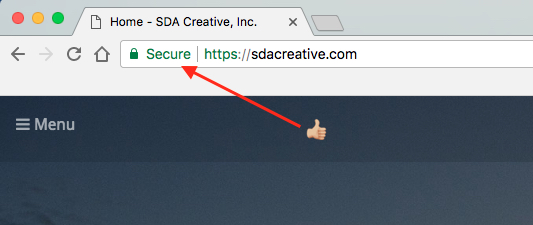Why HTTPS matters? There are two short answers for this question: security and because Google says so (more on that below).
For the past 15 years, we’ve been browsing the internet using what’s called HTTP, which stands for Hypertext Transfer Protocol. It’s the foundation of data communication for the internet and why we’re able to view web pages, use apps and run software. Any time you launch your web browser and view a website, you’re submitting what’s called an HTTP request, which is asking the server to display some information.
But the one drawback with HTTP is that it can be intercepted by hackers. The communication between servers and your device is unencrypted, which means it’s possible for a hacker to intercept that connection and see what you’re looking at.
Another drawback is verification. When using HTTP, your site can be verified that it is who you say it is. So, if hacked, the hacker can begin to impersonate the site, by trying to deliver malicious content to your users or customers, or even try to steal sensitive information!
The solution, then, is to encrypt your site using HTTPS.
You can always tell if you are visiting a site that is encrypted because the address bar in your browser will tell you so with a padlock icon or key icon. You’ll also see https:// before the address.

Look for the secure badge next to the URL in the address bar
My website doesn’t handle any sensitive information. Is HTTPS still important to me?
Yes! Because it is good for your SEO.
In 2014, Google announced that sites using a secure connection (e.g., HTTPS) will be ranked better than those that aren’t secure. That’s because security is Google’s top priority and they want to promote websites that are safe to click to.
“…we’re also working to make the Internet safer more broadly. A big part of that is making sure that websites people access from Google are secure.”

At the start of 2017, web browsers started to warn users when a site is not protected. Any site that is asking for a username/password or even an email address in a contact form, the browser will display a security warning if connected via HTTP.
Give your site a performance boost with HTTPS
Besides being safe and protecting your content (and your users’ information), utilizing HTTPS can make your website significantly faster. Some technologies and servers are designed to make websites faster only when HTTPS is being used.
Take the HTTP vs HTTPS test for example. You’ll see how much faster the secure page loads than the non-secure page.
How do I get my site secure?
If you’re interested in getting your site converted to HTTPS, contact us or call us for details. To learn more about other services we offer, click here.
